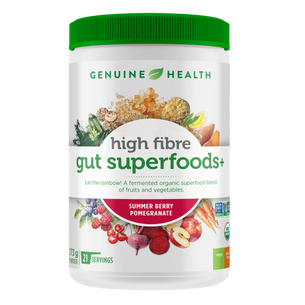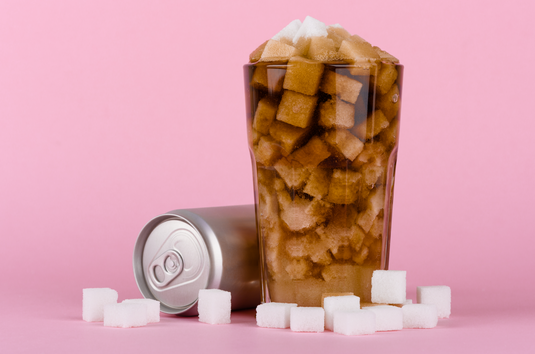6 Ways to Boost Gut Health

Why is it that we intuitively know to “go with our gut” when making important decisions?
As new research is beginning to show, it could be due to the idea that our gut and microbiome have a significant say on the quality of our thoughts – as well as our day-to-day health, and even longer-term risk of developing disease.1,2
The gut is directly connected to the brain by way of the vagus nerve, and also through the influence of the countless chemicals released into the bloodstream, acting as messengers.3 While this means that your brain can be influenced by what’s happening down below, it also allows you to have a say in the matter.
So, how might we keep our intestinal tract and its many bacterial tenants healthy? While research continues to put the pieces of the puzzle together, some safe and practical tips have emerged. Here we go!
-
Consume a diverse array of plant fibres. There are many types of fibre naturally found in plants. Each type may feed a different species. This may partly explain why eating a diverse array of vegetables is so consistently associated with better health.4,5 If you are unable to regularly consume vegetables, certain supplements may help—just be sure they include an array of plant-sourced fibres. high fibre gut superfoods+, is packed with nutrient-dense whole foods and provides 6 grams of fibre from 3 sources including oat, acacia and apple. With wholesome, real ingredients in every scoop, it’s a deliciously simple way to nourish your body and elevate your wellness.
-
Consume probiotic-rich foods. Research has shown that probiotics are key in supporting gut health and the microbiome.6 Some studies have also found that consumption of probiotics can lead to improved mood.7 Try incorporating probiotic-rich food and drinks into your diet, including kombucha, kimchi, and full-fat, grass-fed Greek or Icelandic yogurt. If you don’t like any of these foods, or want extra support, try a supplement. Just make sure that your supplement comes with a delayed-release capsule which helps ensure that the probiotic reaches your gut. A good example would be advanced gut health probiotics, which is encapsulated in a delayed-release capsule designed to resist stomach acid, protecting the strains so they reach the intestine where they can thrive.
-
Consume colourful, organic foods. These foods are usually high in phytonutrients like polyphenols, which are very important for the gut.8 Polyphenols can help modulate the gut microbiome and promote growth of beneficial microbes.9 They have also been shown to have anti-inflammatory and antioxidant properties.9 Eat the rainbow with Genuine Health’s high fibre gut superfoods+, a vibrant blend brings together the best nature has to offer, providing a boost with fresh, high-quality fruits and a variety of land and sea vegetables. Or try adding greens+ into your diet, made with a powerful greens blend backed by clinical studies, scientifically formulated to support gut health, energy and vitality. Full of phytonutrient rich ingredients, superfoods, antioxidants and probiotics.
-
De-stress. Acute bouts of stress, such as public speaking, can induce permeability of the gut lining, which is usually meant to protect against pathogens.10 While stress is fine in small amounts, this provides a new lever through which chronic stress can harm our health.11 Try to find an effective way of dealing with stress that suits your lifestyle, like practicing daily meditation or going for regular walks in nature. Or try stress, made with the soothing powers of ashwagandha, saffron, and passionflower—carefully chosen to help ease stress, so you can feel balanced and at peace every day.
-
Hit the gym. While it’s hard to believe that moving our bodies can influence the microbes living in our intestines, new evidence has shown us that exercise can alter the gut microbial ecosystem, independent of what we consume. In one study, exercise led to more beneficial bacteria in both obese and lean participants.12 One of the ways these bacteria are helpful is that they produce butyrate, a short-chain fatty acid. In the gut environment, butyrate is a powerful anti-inflammatory and may improve many aspects of health.13
- Avoid highly processed foods. A highly processed or high-fat diet can alter the composition of your gut microbiota, leading to dysbiosis—an imbalance between beneficial and harmful microbes.14 These diets, often rich in sugars, unhealthy fats, and refined grains, can reduce the diversity of the microbiome and beneficial bacteria.14 In contrast, a diet rich in fibre and whole plant foods, is shown to better support a healthy microbiome and helps promotes better overall well-being.14
Incorporating these six strategies into your daily routine can go a long way in supporting a healthy gut, which in turn can help whole body health.
Date modified: February 19th, 2025
References
-
Clapp M, Aurora N, Herrera L, Bhatia M, Wilen E, Wakefield S. Gut microbiota’s effect on mental health: the gut-brain axis. Clin Pract. 2017;7(4):987. doi:10.4081/cp.2017.987
-
Zhang YJ, Li S, Gan RY, Zhou T, Xu DP, Li HB. Impacts of gut bacteria on human health and diseases. Int J Mol Sci. 2015;16(4):7493-7519. doi:10.3390/ijms16047493
-
Han Y, Wang B, Gao H, et al. Vagus nerve and underlying impact on the gut microbiota-brain axis in behavior and neurodegenerative diseases. J Inflamm Res. 2022;15:6213-6230. doi:10.2147/JIR.S384949
-
Puhlmann ML, de Vos WM. Intrinsic dietary fibers and the gut microbiome: rediscovering the benefits of the plant cell matrix for human health. Front Immunol. 2022;13. doi:10.3389/fimmu.2022.954845
-
Barber TM, Kabisch S, Pfeiffer AFH, Weickert MO. The health benefits of dietary fibre. Nutrients. 2020;12(10):3209. doi:10.3390/nu12103209
-
Hemarajata P, Versalovic J. Effects of probiotics on gut microbiota: mechanisms of intestinal immunomodulation and neuromodulation. Ther Adv Gastroenterol. 2013;6(1):39-51. doi:10.1177/1756283X12459294
-
Bistas KG, Tabet JP. The benefits of prebiotics and probiotics on mental health. Cureus. 15(8):e43217. doi:10.7759/cureus.43217
-
Minich DM. A review of the science of colorful, plant-based food and practical strategies for “eating the rainbow.” J Nutr Metab. 2019;2019(1):2125070. doi:10.1155/2019/2125070
-
Wang X, Qi Y, Zheng H. Dietary polyphenol, gut microbiota, and health benefits. antioxidants. 2022;11(6):1212. doi:10.3390/antiox11061212
-
Kelly JR, Kennedy PJ, Cryan JF, Dinan TG, Clarke G, Hyland NP. Breaking down the barriers: the gut microbiome, intestinal permeability and stress-related psychiatric disorders. Front Cell Neurosci. 2015;9:392. doi:10.3389/fncel.2015.00392
-
Konturek PC, Brzozowski T, Konturek SJ. Stress and the gut: pathophysiology, clinical consequences, diagnostic approach and treatment options. J Physiol Pharmacol Off J Pol Physiol Soc. 2011;62(6):591-599. https://www.jpp.krakow.pl/
-
Allen JM, Mailing LJ, Niemiro GM, et al. Exercise alters gut microbiota composition and function in lean and obese humans. Med Sci Sports Exerc. 2018;50(4):747-757. doi:10.1249/MSS.0000000000001495
-
Fusco W, Lorenzo MB, Cintoni M, et al. Short-chain fatty-acid-producing bacteria: key components of the human gut microbiota. Nutrients. 2023;15(9):2211. doi:10.3390/nu15092211
-
Martinez JE, Kahana DD, Ghuman S, et al. Unhealthy lifestyle and gut dysbiosis: a better understanding of the effects of poor diet and nicotine on the intestinal microbiome. Front Endocrinol. 2021;12. doi:10.3389/fendo.2021.667066





















































